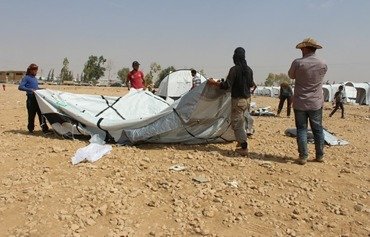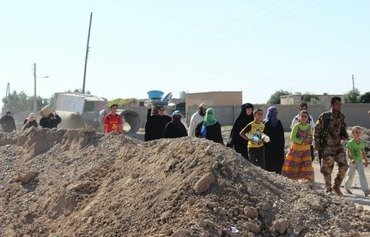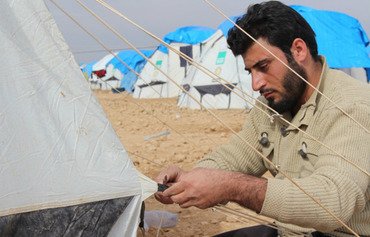The main section of a camp for the displaced in the northern Syrian town of Ain Issa is full, but civilians fleeing the 'Islamic State of Iraq and Syria' keep on arriving.
The camp is a stark affair, with dusty tents flapping in the wind atop white gravel that covers inhabitants in a fine white dust.
People have been arriving at the camp for months, but the pace has picked up as the Syrian Democratic Forces (SDF) press their offensive against ISIS.
The Arab-Kurd alliance is pushing towards al-Raqa city, ISIS's most important remaining bastion in Syria.
The newest arrivals at the central camp are forced to take refuge beyond the bounds of the established tented area, even setting up along the side of the nearby road.
"There are more than 20,000 people in the camp now, and the numbers are growing by the hour," camp director Jalal al-Ayyaf told AFP.
"Since the beginning of the battle of al-Raqa six months ago, more than 100,000 people have arrived at the camp, some of whom have now gone back to their villages and others have gone to stay with relatives in other areas," he added.
He urged international aid groups to "increase assistance for the displaced, whose numbers have exceeded the capacity of the city's local council".
Hundreds of men and women crowded round a truck distributing rations, with one woman carrying away a box of World Food Programme items on her head.
Far from the horror
Elsewhere, women gathered at a red water tank to wash clothes, and two young boys struggled to carry a jerrycan of water together.
Children throng the camp, among them a toddler sitting in the gravel and chewing a piece of plastic, seemingly oblivious to the white dust coating his red trousers.
Nearby, two boys played on a makeshift swing, sitting on loops of yellow rope tied to a metal frame.
And in a tent, a family tried to use a pink pacifier to settle a baby crying inside a bundle of blankets stuffed into a wire rocking crib.
But despite all the hardships, the camp is safe, and far from the horrors residents say they endured under ISIS control and during their escape.
New arrival Abu Ahmed, 47, fled from the al-Rashid Farms area north of al-Raqa city and described a harrowing journey.
"They fired on our vehicles and set fire to our tents while we were fleeing," he said.
"They mined the bridges, and mined areas before they withdrew from them," he told AFP.
Khalid, a resident of al-Sabahiya district in al-Raqa, arrived at the camp two days earlier and still looked exhausted.
"We could not believe that we had arrived here," he said.
"ISIS prevents those who want to come here -- it damages their vehicles to stop them escaping," he added.
'Looking for safety'
"They executed several people who tried to escape a few days ago," Khalid said.
Another al-Raqa resident, Talal, said ISIS fighters were keeping an eye out for people with tents that could be used to camp along an escape route.
"The situation is very bad," the 36-year-old said.
"Everyone in the city is looking for safety."
SDF fighters are just a few kilometres from al-Raqa city to the north and east, but are still working to encircle it from the west and south.
They have said a final assault could begin next month, and the US has pledged additional support to bolster the forces ahead of time.
Hamza al-Hussein, a resident of al-Raqa's al-Daraiya neighbourhood, said ISIS fighters were hunkering down for a battle.
"They have surrounded the area with mines and put up wooden frames they brought from Iraq," he said.
The frames are erected over streets and covered with cloth to block the view of coalition aircraft overhead.
"They have even blocked off streets with berms of earth and cement," he added.
He said his nephew was killed by a mine blast as they escaped the city.
"We brought him with us and buried him here."
Khalid said there was no more local support for ISIS, and residents were waiting for the city to be liberated.
"No one can stand them anymore," he said.
"Everyone is looking for a way to be rid of them."

![Displaced Syrians, who fled the countryside surrounding the 'Islamic State of Iraq and Syria' stronghold of al-Raqa, arrive at a temporary camp in Ain Issa on May 1st. The main section of the camp is full, but civilians fleeing ISIS keep on arriving. [Delil Souleiman/AFP]](/cnmi_di/images/2017/05/22/7931-syria-displaced-isis-600_384.jpg)






